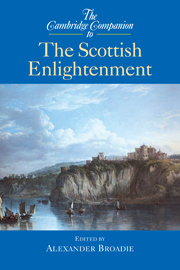Book contents
- Frontmatter
- Introduction
- 1 The contexts of the Scottish Enlightenment
- 2 Religion and rational theology
- 3 The human mind and its powers
- 4 Anthropology: the ‘original’ of human nature
- 5 Science in the Scottish Enlightenment
- 6 Scepticism and common sense
- 7 Moral sense and the foundations of morals
- 8 The political theory of the Scottish Enlightenment
- 9 Economic theory
- 10 Natural jurisprudence and the theory of justice
- 11 Legal theory
- 12 Sociality and socialisation
- 13 Historiography
- 14 Art and aesthetic theory
- 15 The impact on Europe
- 16 The impact on America: Scottish philosophy and the American founding
- 17 The nineteenth-century aftermath
- Select bibliography
- Index
5 - Science in the Scottish Enlightenment
Published online by Cambridge University Press: 28 May 2006
- Frontmatter
- Introduction
- 1 The contexts of the Scottish Enlightenment
- 2 Religion and rational theology
- 3 The human mind and its powers
- 4 Anthropology: the ‘original’ of human nature
- 5 Science in the Scottish Enlightenment
- 6 Scepticism and common sense
- 7 Moral sense and the foundations of morals
- 8 The political theory of the Scottish Enlightenment
- 9 Economic theory
- 10 Natural jurisprudence and the theory of justice
- 11 Legal theory
- 12 Sociality and socialisation
- 13 Historiography
- 14 Art and aesthetic theory
- 15 The impact on Europe
- 16 The impact on America: Scottish philosophy and the American founding
- 17 The nineteenth-century aftermath
- Select bibliography
- Index
Summary
During the past thirty years the role of the natural sciences and medicine in the Scottish Enlightenment has been hotly debated. Elaborating on the interpretation of the Scottish Enlightenment advanced by Nicholas Phillipson, John Christie argued in a series of influential essays that the pursuit of natural knowledge was one of the 'major elements whose combination formed the culture of the Scottish Enlightenment'. Stronger claims for the importance of science and medicine were subsequently made by Roger L. Emerson, who contended that if we are properly to understand the origins and defining characteristics of the Scottish Enlightenment then we must see the cultivation of natural knowledge as being central to enlightened culture in eighteenth-century Scotland. On the other hand, following the lead of Hugh Trevor-Roper (Lord Dacre), John Robertson recently insisted that the Scottish Enlightenment should be defined in terms of a core of related enquiries in moral philosophy, history and political economy, and that the natural sciences and medicine were peripheral to the intellectual preoccupations of enlightened savants in Scotland and in the Atlantic world more generally. Richard Sher likewise rejects Emerson's claims, and suggests that the Scottish Enlightenment can be more fruitfully defined in terms of the 'culture of the literati' which, for Sher, encompassed science and medicine but was not rooted in these fields. While it would be inappropriate here to enter into the complexities of this debate, we should recognise that the points at issue are far from trivial because they raise serious questions not only about how we characterise the Enlightenment as an historical phenomenon but also about how we conceptualise the genesis of our own world.
- Type
- Chapter
- Information
- The Cambridge Companion to the Scottish Enlightenment , pp. 94 - 116Publisher: Cambridge University PressPrint publication year: 2003
- 7
- Cited by



